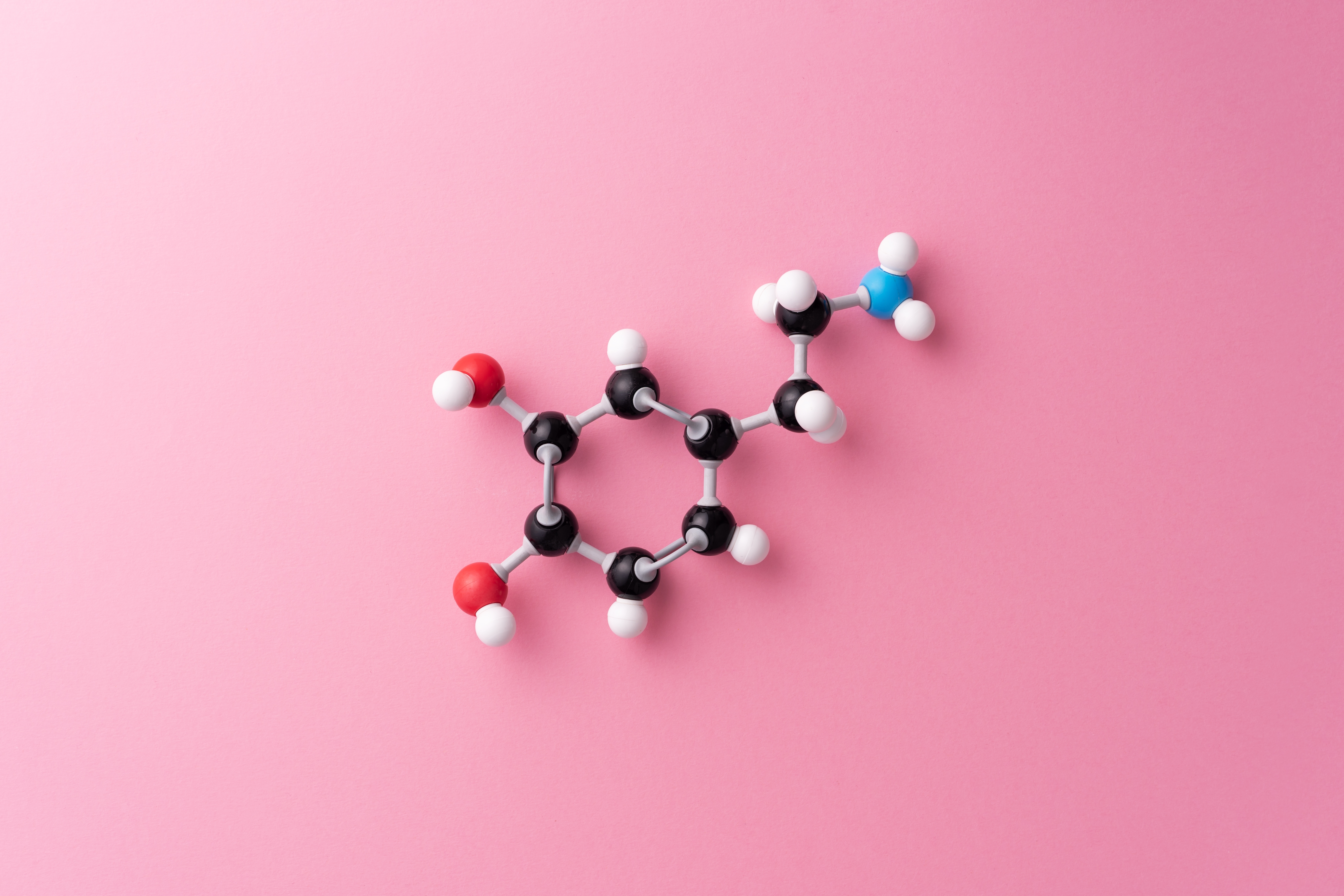Dopamine – it’s the thing that makes us feel good, right? Well, it turns out it’s a bit more complex than that. In fact, it’s quite the multitasker.
What is dopamine?
Dopamine is a neurotransmitter – aka a chemical messenger released by a neuron that affects the activity of another. In dopamine’s case, that’s actually a lot of neurons; there are multiple different pathways within the brain that use dopamine as a signaling molecule, reflecting the wide range of functions it’s involved in.
It plays a big role in movement, for example – the degradation of neurons related to dopamine is a hallmark of the movement disorder Parkinson’s disease. You’ve probably heard of dopamine as the “pleasure chemical” too, because it’s a major player in our brain’s reward pathways; when we do something nice, like listening to music or sniffing a baby’s head, we get a big ol’ hit of dopamine, which motivates us to do that behavior again (maybe don’t do the latter too much though).
But simply calling it the “pleasure chemical”, while commonplace, is a little too simplistic and doesn’t capture everything dopamine does.
For example, it’s also involved in love and desire, and as such has a starring role in quite possibly the saddest story ever involving prairie voles.
There are some other conditions where scientists think dopamine could be important, but at present, it’s not entirely clear how. For example, it’s frequently been associated with ADHD, but some research suggests that it’s not necessarily a major player. There’s also a long-standing hypothesis that dopamine dysfunction is a cause of schizophrenia, though not everyone agrees with this theory.

Dopamine consists of what’s known as catechol (a benzene ring with two hydroxyl groups attached) and an amine (a nitrogen with two hydrogen atoms) attached by an ethyl chain.
Image credit: bogdandimages/Shutterstock.com
For the chemistry fans, dopamine is the smallest member of a wider family of neurotransmitters called the catecholamines, which also includes everyone’s favorite hormonal siblings, epinephrine and norepinephrine.
It’s involved in breast milk production
We’ve covered some of the perhaps better-known roles of dopamine, but did you know that it’s involved in regulating lactation too? It does this through one of the four major dopamine pathways in the brain, the gloriously named tuberoinfundibular pathway, which helps to connect the hypothalamus and the pituitary gland.
The pituitary gland, a little pea-sized gland at the base of the brain, secretes prolactin, a hormone that stimulates the mammary glands in breasts to produce milk. However, to keep this system nice and balanced – babies aren’t feeding all the time, after all – there needs to be some regulation. That’s where dopamine comes in as part of a nice little negative feedback loop.
Prolactin doesn’t seem to be one for self-preservation, as its secretion actually ends up stimulating dopamine to be released in the hypothalamus. This provides dopamine to the pituitary gland and tells it to stop making prolactin.
This pathway is one of the reasons why some medications that specifically block dopamine signaling can cause some people to produce milk when they’re not pregnant or breastfeeding – this side effect is known as galactorrhea.
It helps to wake you up
Not to be the bearer of bad news, but the so-called “pleasure chemical” plays a part in one of the least pleasurable parts of the day – bringing an end to a delicious night of sleep.
This takes place in the pineal gland, the pea-sized part of the brain that plays a part in the sleep-wake cycle through its production of the big cheese of sleep regulation, melatonin. According to a 2012 study, towards the end of the night, receptors for dopamine in this gland buddy up with those for fellow catecholamine norepinephrine, in a process known as heteromerization.
In this newfound relationship, dopamine definitely wears the pants; when it interacts with the receptor duos, it stops norepinephrine signaling. As norepinephrine helps to regulate melatonin production, this means that there’s a decrease in the synthesis and release of melatonin, and so the process of waking up begins.
It has a dark side
People say you can have too much of a good thing, and that’s certainly the case for dopamine when it comes to substance addiction.
Rather than providing a regular dose of dopamine to the brain’s reward pathway, some drugs instead flood it. Like any other thing that gives us a dopamine hit, the brain remembers this and associates taking the drug (and elements like where and when it was taken) with how it makes us feel.
This creates connections between neurons that motivate the brain to seek out the substance again. Over time, the brain tries to adapt, altering the reward-motivation pathway to become less sensitive to dopamine. That’s why people then end up craving more and more of a psychoactive substance to get the same level of high – the brain has become tolerant.
The decrease in sensitivity also means that people get even less pleasure out of naturally rewarding experiences, decreasing motivation to seek out those behaviors, but increasing the need to continue taking drugs in order to get that rewarding feeling, creating a vicious cycle.
All “explainer” articles are confirmed by fact checkers to be correct at time of publishing. Text, images, and links may be edited, removed, or added to at a later date to keep information current.
The content of this article is not intended to be a substitute for professional medical advice, diagnosis, or treatment. Always seek the advice of qualified health providers with questions you may have regarding medical conditions.
Source Link: Dopamine: Everything You Didn’t Know You Didn’t Know